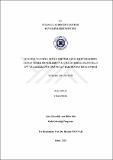DSpace Repository
İSTANBUL'DA TOPLU YEMEK ÜRETİMİ YAPAN İŞLETMELERDEN ALINAN YEMEK ÖRNEKLERİNİN BACİLLUS CEREUS, SALMONELLA SPP. VE ESCHERİCHİA COLİ O157:H7 BAKIMINDAN İNCELENMESİ
JavaScript is disabled for your browser. Some features of this site may not work without it.
| dc.contributor.author | Acun, Aylin
|
|
| dc.date.accessioned | 2019-05-29T08:29:07Z | |
| dc.date.available | 2019-05-29T08:29:07Z | |
| dc.date.issued | 2018 | |
| dc.identifier.uri | http://hdl.handle.net/11547/2329 | |
| dc.description.abstract | Toplu yemek sektörü, tarım toplumundan sanayi toplumuna geçiĢ sürecinin hız kazanmasında etkin rol oynayan teknolojik geliĢmelerle birlikte günlük hayatta yerini almayı baĢarmıĢ ve gün geçtikçe büyümekte olan bir sektördür. Endüstri kollarının hızla geliĢmesi, kentleĢmenin hızlanması, çalıĢan nüfusundaki artıĢ, gelir düzeyinin artması akabinde eğlence, tatil ve seyahate ayrılan zamandaki artıĢ ile birlikte „Toplu Beslenme Sistemleri‟ kapsamındaki toplu yemek üretimi yapan iĢletmelerin sayıları da artmaktadır. Okullar, üniversite ve yüksekokullar, fabrika ve iĢyerleri, askeri birlikler, hastaneler, oteller, restoranlar, cafeler, ayaküstü atıĢtırmalık yerler (fast-food), dinlenme ve eğlence yerleri, yaĢlı ve muhtaç evleri, hapishane ve ıslah evleri, kreĢ ve çocuk evleri bu hizmeti veren iĢletmeler olarak sayılabilmektedir. Kitlelere hizmet veren yemek sektöründe, gıda hijyeni ve güvenliği kavramları önem arz etmektedir. Gıdaların içeriğini oluĢturan proteinler, yağlar, karbonhidratlar, mineral maddeler, vitaminler ve su gibi değiĢik besin öğeleri, hastalık etmeni olan mikroorganizmaların besin ka ynaklarıdır. Uygun koĢullar (sıcaklık, ph, su aktivitesi vs.) mevcut olduğunda patojen mikroorganizmalar dediğimiz bu bakteriler geliĢerek gıda kaynaklı mikrobiyolojik hastalıklara; enfeksiyonlara ya da intoksikasyonlara neden olmaktadır. ÇalıĢmada, Ġstanbul‟da toplu yemek üretimi yapan iĢletmelerden alınan yemek örneklerinin Bacillus cereus, Salmonella spp. ve Escherichia coli O157:H7 açısından incelenmesi yapılmıĢtır. Bu amaçla; toplu yemek üretimi yapan 15 yemek firmasından 22 adet çorba, 16 adet pilav , 6 adet makarna, 20 adet etli yemek, 6 adet tavuklu yemek, 9 adet etsiz yemek, 14 adet çiğ parça et ve 7 adet çiğ parça tavuk olmak üzere 100 adet örnek toplanmıĢtır. PiĢmiĢ yemek örnekleri (79) Bacillus cereus, Salmonella spp. ve Escherichia coli O157:H7 bakterileri açısından, çiğ örnekler (21) ise Salmonella spp. ve Escherichia coli O157:H7 açısından taranmıĢtır. Analizlerin sonuçları Türk Gıda Kodeksi Mikrobiyolojik Kriterler Yönetmeliği‟ne göre değerlendirilmiĢtir. Ġncelenen örneklerin hiçbirinde Escherichia coli O157:H7 „ye rastlanmazken, 1 örnekte (1%) Salmonella spp.; 12 örnekte (15,2%) ise Bacillus cereus tespit edilmiĢtir. Toplam 3 (3%) gıda örneğinin TGK Mikrobiyolojik Kriterler Yönetmeliği‟ne göre uygun olmadıkları, halk sağlığı için risk oluĢturdukları belirlenmiĢtir. | tr_TR |
| dc.language.iso | tr | tr_TR |
| dc.publisher | İSTANBUL AYDIN ÜNİVERSİTESİ FEN BİLİMLERİ ENSTİTÜSÜ | tr_TR |
| dc.subject | Toplu Yemek | tr_TR |
| dc.subject | Bacillus cereus | tr_TR |
| dc.subject | Salmonella spp | tr_TR |
| dc.subject | Escherichia coli O157:H7 | tr_TR |
| dc.subject | Catering | tr_TR |
| dc.subject | Bacillus cereus | tr_TR |
| dc.subject | Salmonella spp | tr_TR |
| dc.subject | Escherichia coli O157:H7 | tr_TR |
| dc.title | İSTANBUL'DA TOPLU YEMEK ÜRETİMİ YAPAN İŞLETMELERDEN ALINAN YEMEK ÖRNEKLERİNİN BACİLLUS CEREUS, SALMONELLA SPP. VE ESCHERİCHİA COLİ O157:H7 BAKIMINDAN İNCELENMESİ | tr_TR |
| dc.type | Thesis | tr_TR |
| dc.description.abstractol | The catering sector is a growing sector that has taken its place in everyday life with technological developments that play an active role in accelerating the transition period from agriculture society to industrial society. Rapid development of industry, increase in income level; the number of enterprises engaged in collective food production within the scope of 'Mass Nutrition Systems' is increasing due to reasons such as increasing time for leisure, holiday and traveling, acceleration of urbanization, increase in working population and transition of women to business life. There are schools, universities and colleges, factories and workplaces, military units, hospitals, hotels, restaurants, cafes, fast food, rest and fun places, old and needy houses, prisons and correctional homes, can be regarded as enterprises providing services. Food hygiene and safety are important in catering sector serving the community. Various food items such as proteins, fats, carbohydrates, minerals, vitamins, and water that make up the content of foods are the food sources of microorganisms that cause disease. When appropriate conditions (temperature, pH, water activity, etc.) are present, these bacteria, which we refer to as pathogenic microorganisms, causing intoxications to the infections. In this study; Bacillus cereus, Salmonella spp. and Escherichia coli O157: H7 samples were taken from the establishments producing bulk meals in Istanbul. For this purpose; 100 samples including 15 pieces of soup, 16 pieces of rice, 6 pieces of pasta, 20 pieces of meat meal, 6 pieces of chicken meal, 9 pieces of meatless food, 14 pieces of raw meat and 7 pieces of raw chicken It was collected. Examples of cooked meals (79) were Bacillus cereus, Salmonella spp. and Escherichia coli O157: H7 in terms of bacteria, and raw samples (21) in Salmonella spp. and Escherichia coli O157: H7. The results of the analyzes were evaluated according to Turkish Food Codex Microbiological Criteria Regulation. In none of the samples examined Escherichia coli O157: H7 was found, whereas in 1 sample (1%) Salmonella spp .; Bacillus cereus was detected in 12 samples (15.2%). A total of 3 (3%) food samples were found to be unsuitable according to the TFC Microbiological Criteria Regulation, posing a risk for public health. | tr_TR |
| dc.publisher.firstpagenumber | 1 | tr_TR |
| dc.publisher.lastpagenumber | 66 | tr_TR |
Files in this item
This item appears in the following Collection(s)
-
Tezler -Thesis [265]
